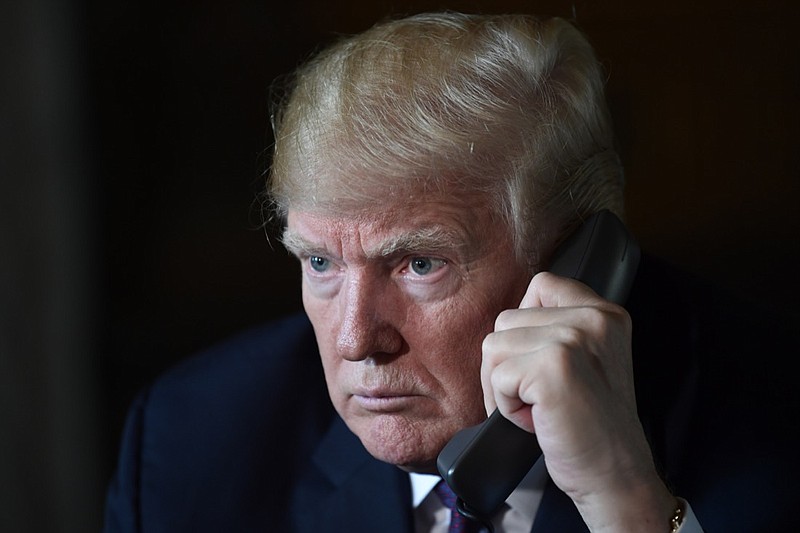Two years after Donald Trump was elected president, people are still trying to determine just who it is we have as the leader of the United States.
Many people don't care who he is or what he does if he produces results for the country, reduces taxes and regulations, promotes life and liberty, and gives as good as he gets.
Other people don't care for him because he beat the invincible Hillary Clinton, because he is reducing taxes and regulations, because he does promote life and liberty, or because he does give as good as he gets.
Still others long for a president who accomplishes the things Trump has in two years in office but who comports himself in the dignified manner most presidents have for more than 225 years.
We'd like the latter version, we'll freely admit. We, like many others, thought the president would become more dignified - more presidential, if you will - once he a) won the nomination, b) won the presidency (a scenario we hardly imagined would occur) or c) was inaugurated.
We know now we're not going to get that.
Outgoing Tennessee Sen. Bob Corker, as head of the Senate Foreign Relations Committee and someone the president courted for vice president and for secretary of state, has had a front-row seat for this unconventional presidency and with this unconventional politician.
"It's not an act," he told Times Free Press editors and reporters in a meeting last week.
Where most presidents have the majority of their day scheduled for meetings and appointments, Trump does not, Corker said. Instead, he spends many hours of the day in "executive time."
That "executive time" is not down time or nap time or paperwork time. It's time he often spends on the phone, hearing this opinion from this person and that opinion from that person. Often, the last opinion carries the day, Corker said.
Indeed, Corker told the Chattanooga Rotary Club earlier this month that Trump is the hardest working president of the three (George W. Bush, Barack Obama and Trump) with whom he has served.
He is up early and on the phone, the former Chattanooga mayor said, and works the phones until late at night.
Unfortunately, Corker said, the same man who is unfailingly polite when beginning a meeting - "What can I get you?" - "has decided that his governing model is about anger, divisiveness and hate."
Trump seems to thrive, he said, if there's a battle.
"He's very combative," Corker said.
So, Trump is not reined in by appointments and meetings, and he is not reined in by a chief of staff who traditionally plays that role, he said.
The president's first chief of staff, former Republican National Committee chairman Reince Priebus, lasted slightly more than six months in the job. The second, John Kelly, who originally had been appointed Homeland Security secretary, has served since. Kelly, a retired U.S. Marine Corps general Corker called a "national treasure," has lost his ability to have that influential voice.
"The president hasn't let him be chief of staff," he said.
The question many people asked themselves as they voted in the mid-terms earlier this month and may ask themselves as they consider a potential second Trump term in 2020 is whether the negative juju he emits is outweighed by what he has accomplished.
The president himself, we believe, would be seriously surprised by such a consideration. He is, he would say, who he always was. When someone voted for him, they were voting for a man who liked to have attention focused on himself, who liked to keep his own counsel, and whose style was brash, confrontational and relentless.
We turn to such a luminary to confirm that as Regis Philbin, the longtime talk show and game show host.
In his 2011 autobiography "How I Got This Way," long before Trump announced his 2016 presidential run, Philbin described the man he said he sometimes called "The Trumpster" and with whom he became good friends.
He talked about a man who is "flamboyant," "colorful," "certainly will not be quiet," "doesn't mind a camera taking his picture" and "loves publicity."
"It's part of his life," Philbin said. "He thrives on it."
Presciently, he also described a Trump who "may not have liked what the media was saying about him" but was was glad they were saying it, who felt somebody was "serenading him with a love song" when the individual said something offensive to him, and who has his detractors and rivals, "those who resent him, don't like him [and] think he exaggerates too much."
Yet, Philbin said, "the people who work for him talk about his energy and his confidence and, most important, his optimism."
All of those - the good and the bad - also are part of Trump, the president.
"From a Republican standpoint," Corker said, "he's been effective." However, he said he's not sure "people will appreciate that approach over an eight-year period of time" and that his everyday demeanor wasn't an appropriate way of showing young people how to conduct themselves.
As we've said, we would prefer to see more statesmanlike behavior in the White House, but we're not among the naysayers who believe Trump's conduct is doing long-term damage to the country or to the Republican Party. Remember, people frequently said during Obama's first term we couldn't stand another term of the damage they felt he was doing to the country.
We survived Obama. We'll survive Trump. In the meantime, we hope he'll appeal to, as Corker said, his "better angels" for the good of the country.
